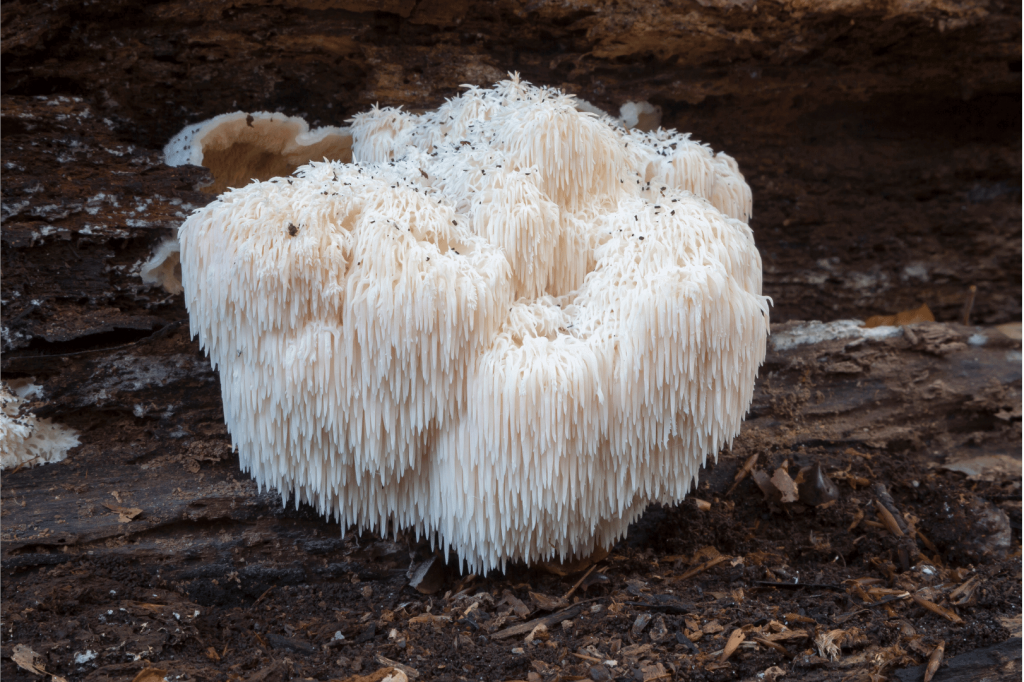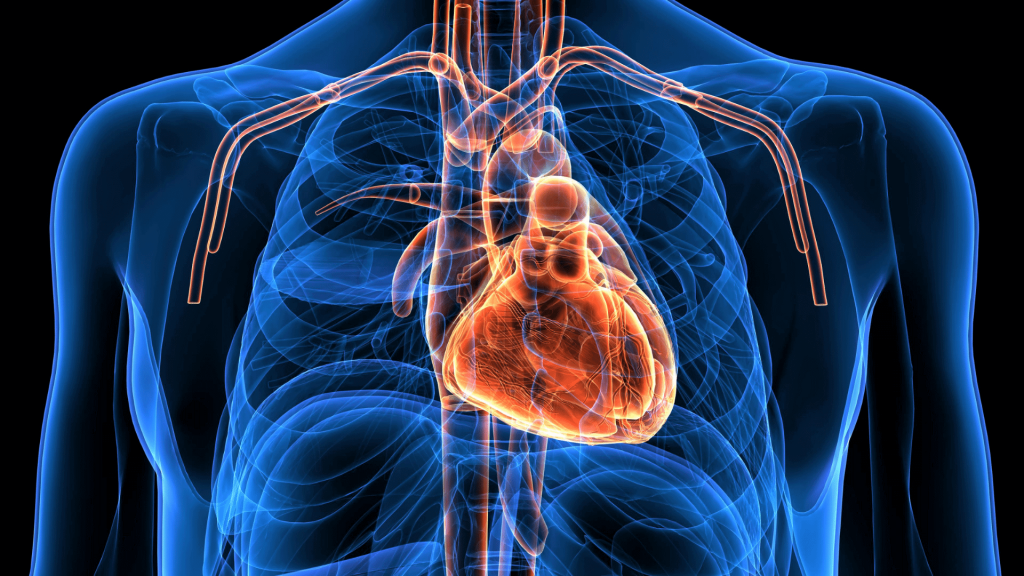Lion’s mane, or Hericium erinaceus, is an edible mushroom which is a part of traditional Asian medicine. It’s the most popular mushroom for its nootropics and neurogenesis benefits. In this article, we will cover everything you need to know about lion’s mane, from benefits to side effects.
What is Lion’s Mane mushroom?
Lion’s mane (Yamabushitake or hou tou gu) is an important medicinal and culinary mushroom in oriental cultures. This mushroom grows mostly on dead or old trees in Asia and across North America. Since it is white in color and has dangling spines like a beard, it is relatively easy to recognize it on the hardwood trees.
Historically, Lion’s mane has been an important remedy in Chinese and Japanese traditional medicines. This mushroom is nutritive to lungs, spleen, liver, kidneys, and the heart. Asian cultures also believe that it enhances digestion, helps with ulcers and gastritis, as well as general weakness and insomnia.

What are Lion’s mane’s active substances?
Many polysaccharides in the cell walls and fruiting bodies of lion’s mane have medicinal benefits. For example, heteroxyloglucans, galacto-xyloglucans, xylans, and glucoxylans inhibit cell growth and cause apoptosis (cell suicide) in abnormal cells. Other polysaccharides reduce oxidative stress and protect cells from premature apoptosis.
Terpenoids are smaller hydrocarbons with lower molecular weights. There are two classes of terpenoids unique to lion’s mane, hericenones and erinacines. These two easily cross the blood-brain barrier to support and protect neurons. Additionally, they induce nerve growth factor synthesis.
Other chemicals in lion’s mane, corallocin A, hericerin, isohericenol, and N-de-phenylethyl isohericerin increase brain-derived neurotrophic factor in rodent neurons in test tube studies.
All Hericium erinaceus extracts can inhibit the growth of some bacteria, such as Staphylococcus aureus (MRSA) and Salmonella in test tube studies.
Generally, lion’s mane is a great source of nutrients necessary for proper brain functioning, but also for other vital organs and functions.
Brain, mental health, and cognitive benefits of Lion’s Mane
Brain, mental health, and cognitive benefits of lion’s mane include:
- Boost mood
- Improves focus
- Helps with learning
- Support a calm and flow state
- Improves brain cell regeneration
- Helps with memory
The following is how lion’s mane deliver these brain benefits.
Counteracts age-related cognitive impairment
Age-related cognitive impairment can arise due to:
- Increased in inflammation
- Reduced neurogenesis
- Reduced ability to refold proteins correctly
- Increased oxidative stress
- Mitochondria dysfunction
- Nutrient deficiencies from reduced appetite and poorer digestion
Lion’s mane may mitigate many of these age-related physical and mental decline.
A study included 30 Japanese women and men, aged 50 to 80, with mild cognitive impairment. There were 2 groups – one that received four tablets containing 96% of lion’s mane dry powder, 3 times a day for 16 weeks; and the other group received a placebo. Both groups then underwent cognitive tests, which measured verbal, drawing, visuospatial, and construction abilities.
The lion’s mane group were on a significantly higher level on the cognitive function scale than the control group. Furthermore, the scores increased the longer the subjects consumed lion’s mane. However, cognitive scores dropped significantly 4 weeks after the intake of Hericium erinaceus stopped. Nevertheless, these results show that lion’s mane can help mild cognitive impairment.
In one study, mice received lion’s mane extract over the course of 30 days. Lion’s mane reduced the formation of plaques and enhanced the formation of new neurons and the connections between them.
A rat study researched the role of polysaccharides found within lion’s mane, and their possible neuroprotective effects. Rats received 250μg/ml of lion’s mane polysaccharides, which induced higher cell viability, prevented cell shrinkage, and degradation.
Additionally, a mice study investigated the role of lion’s mane in learning and memory deficits. Mice received 10μg of amyloid β, which induces cognitive impairment, and ate a diet based on lion’s mane for 23 days. The results demonstrated that lion’s mane prevented spatial short-term and visual recognition memory deficits caused by amyloid β. These findings support the idea that lion’s mane reduces cognition-related issues associated with amyloid β. However, we still need a human trial to confirm this benefit of lion’s mane.

Improves acetylcholine
Acetylcholine is one of your most important neurotransmitters for cognitive functions, memory, and brain health.
Furthermore, lion’s mane enhances acetylcholine concentrations in blood and hypothalamus in mice. The mushroom polysaccharides work by increasing enzymes that produce acetylcholine. This mechanism is different from many other cholinergic nootropics which work by inhibiting the enzyme that breaks down acetylcholine. Therefore, lion’s mane combined with other cholinergics may have additive effects on brain acetylcholine levels.
Also, by enhancing nerve growth factor, lion’s mane preserves and stimulates the growth of the basal forebrain’s cholinergic neurons.
Protects and supports the growth of hippocampal neurons
The hippocampus is your brain’s memory center. It tends to shrink in adults with mood issues. Animal studies suggest that lion’s mane may help with mood by enhancing neurogenesis in the hippocampus.
A study involving male mice focused on the effect of lion’s mane on mood. One group received a lion’s mane dosage, 20 or 60mg/kg body weight, once a day for four weeks, while the other group received saline of the same amount and duration. They found that a lion’s mane enhanced the formation of new neurons and synapses within the hippocampus. Behavioral tests also showed that the lion’s mane group moved and explored more, and had better mood and motivation amidst stress.
Supports healthy neurotransmitter and inflammation balance
Day to day stress can throw off neurotransmitters and increase inflammation in the brain. These can reduce cognitive function, energy levels, motivation, focus, and mood.
In mice, ethanolic extract of lion’s mane high in erinacine A seems to support mood and cognitive functions through neurotransmitter and inflammation balance.
Mice received 100, 200, or 400 mg/kg body weight of the extract once a day for 4 weeks. Two weeks into the study, they received restraint stress for 2 weeks. The control group was not exposed to these protocols, nor lion’s mane.
Stressed mice typically move less in water and when held from the tail, while exploring more in elevated plus maze tests. Along with these behaviors, their dopamine, serotonin, and norepinephrine levels drop as their inflammatory cytokines like tumor necrosis factor (TNF-alpha) and interleukin-6 (IL-6) increase.
Animals that received the mushroom had increased levels of dopamine, serotonin, and norepinephrine, as well as decreased TNF-alpha and IL-6. They also had increased brain-derived neurotrophic factor levels. These results were especially significant in groups that received 200 and 400 mg/kg body weight.
These results suggest that lion’s mane may support mood by promoting neurotransmitter and inflammation balance.
Stimulates neurotrophins
Neurotrophins are proteins that support the survival, growth, and function of neurons. There are many of these, but two of the most important ones are brain-derived neurotrophic factor (BDNF) and nerve growth factor (NGF). BDNF is important for learning, memory, mood, and deep sleep. NGF supports sympathetic, sensory, and cholinergic neurons in the forebrain.
Cell-based studies show that lion’s mane constituents increase NGF and BDNF production.
In a placebo-controlled study involving 30 menopausal women, lion’s mane effectively boosted mood, reduced irritability, sleep, and wellbeing. The authors speculated that the lion’s mane helped by boosting nerve growth factor.
In a study in overweight/obese patients, 77 volunteers received lion’s mane. The lion’s mane extract didn’t significantly boost their blood BDNF, but it did boost their precursor to BDNF levels in the blood. The subjects also had improved mood, calmness, and sleep.
Support neuronal repair and regeneration
Day-to-day stress and elements can create minor damages to the nervous system. Lion’s mane supports the repair of neurons and other cells in the nervous system.
Having in mind the detrimental effects of nervous system injuries, neural re-connections are of huge importance. A study using dissociated chick embryo cells from the brain and spinal cord investigated the importance of lion’s mane for neurite outgrowth. 50µg/ml lion’s mane extract caused increased neurite outgrowth in the brain (by 20.47%) and in the special cord (by 22.47%).
Another in vitro study aimed to investigate how lion’s mane affects myelination, the process which makes insulating myelin sheaths to surround the axon. The lion’s mane extract promoted faster myelination, which started earlier than in the control cells.
A rat study focused on lion’s mane polysaccharides. Rat cells received doses of either lion’s mane extract, or nerve growth factor and brain-derived nerve factor. The results showed enhanced growth of adrenal nerve cells and neurite outgrowth, which was even higher than by nerve growth factor or brain-derived nerve factor.
Improves sleep

Lion’s mane can uniquely help with sleep. It’s not a sedative but it improves sleep quality through supporting brain balance.
A study involved 77 overweight individuals who experienced mood or sleep problems. Participants received oral lion’s mane supplement for 8 weeks, which resulted in a reduction of mood and sleep issues. They also had increased pro-BDNF levels.
One study included 8 female students who took 6 lion’s mane tablets a day, over a 4 week period. Based on a self-administered survey, lion’s mane supplementation improved their sleep quality and the general feeling of wellbeing.
Other health benefits of lion’s mane
Animal and cell-based studies have demonstrated many benefits of lion’s mane, although clinical evidence is still missing for a lot of them. Please note that we include this information for educational purposes only. We’re not suggesting that lion’s mane can treat any conditions. It’s not approved to treat or diagnose any conditions. Please see your doctor for appropriate diagnosis and treatment.
Inhibits bacterial growth
Hericium erinaceus is also an effective agent against bacteria. It works against gram-positive and gram-negative bacteria.
It successfully kills Helicobacter pylori and Staphylococcus aureus Thus, the lion’s mane is a great antibacterial agent.
Nourishes and protects the digestive tract
Lion’s mane protects and strengthens your digestive tract. First off, lion’s mane nourishes and protects your spleen and liver.
Furthermore, lion’s mane strengthens the stomach barrier protection against acid.
Promotes heart health
Lion’s mane can also be beneficial for your heart and cardiovascular system.
Lion’s mane can thin the blood. Hericenone B, found in lion’s mane ethanol extract, inhibits collagen-induced platelet aggregation. However, it did not inhibit any other platelet aggregation pathway, like thrombin. Extensive research on rabbit and human platelets supports this.
Oxidized low-density lipoprotein (LDL cholesterol) is very bad for cardiovascular health because it’s more likely to harden the arteries. A study showed that a hexane extract of lion’s mane inhibits the oxidation of LDL cholesterol. This is one of the ways that lion’s mane can help your cardiovascular health.
A high-fat diet is a risk factor for the development of many cardiovascular diseases in mice, which is equivalent to a human junk food diet. A mice study aimed to investigate the role of lion’s mane in fat metabolism. Mice ate a high-fat diet for 28 days. One group received a daily dose of lion’s mane, while the control group received the high-fat diet only. The group that had lion’s mane incorporated into their diet had 27% lower triglyceride levels and 42% less weight gain than the control group. Thus, lion’s mane promotes fat metabolism and healthy blood lipids, and somewhat protects your cardiovascular system from poor diet.

Improves cellular antioxidant defense
Oxidative stress is essential in many situations, but too much of it can be bad. For example, it can cause fatigue, interfere with cognitive function, and contribute to many diseases.
Lion’s mane activates cellular pathways that counteract oxidative stress. In a mice study, lion’s mane extract adjusted the synthesis and processing of nitric oxide, superoxide dismutase, and malondialdehyde within serum.
In another study, scientists investigated the antioxidant properties of multiple mushroom species, including lion’s mane. The antioxidant index described antioxidant potentials. Lion’s mane is among the top three species with strongest antioxidant capabilities, having an antioxidant index of 17.7%.
One more mice study dealt with lion’s mane effect on hippocampal neurons treated with hydrogen peroxide. The hot water extract of Hericium erinaceus significantly increased the activity of antioxidant enzymes and viability of neurons treated with hydrogen peroxide, as well as decreased the amount of reactive oxygen species.
Boosts your immunity
Our immunity is the primary shield against different bacteria and viruses. Lion’s mane might have a beneficial effect even on your immune system.
One mice study researched the immunomodulatory effects of lion’s mane. This mushroom improved both cell-mediated and humoral immunity, meaning killer cells and antibody efficacy. These properties are likely related to the lion’s mane ability to regulate gut mucosal immune barrier.
Apart from the adaptive immunity covered by the previous study, lion’s mane also enhances innate immunity. Mice injected with Salmonella species had 4 times longer lifespan if they also received lion’s mane extracts. This increased resistance to bacterial infections comes from stronger immune activation.
Promotes a balanced inflammatory response
Lion’s mane, like many other medicinal mushrooms, support both immune system readiness and balance. It often helps balance excess inflammation from the modern diet and lifestyle and aging.
Obesity and unhealthy metabolism can contribute to chronic inflammation. Lion’s mane counteracts excess inflammation from macrophages in fat tissues.
In a mouse model of gut inflammation, 200 and 500 mg of lion’s mane extract mitigates the inflammation and protects the gut barrier. As a result, the animals had less digestive symptoms.
Similar results are visible within microglia, where lion’s mane extracts have anti-inflammatory activity and reduce neurotoxicity in the brain.
Support healthy blood sugar control
Several animal studies show that lion’s mane can improve blood sugar control. It inhibits α-glucosidase, an enzyme that breaks carbohydrates down, slowing down carbohydrate absorption. Also, lion’s mane may also help with blood sugar by balancing inflammation, counteracting oxidative stress, and supporting other aspects of heart health.
A study included rats with diabetes, who received 100 or 200mg/kg body weight of H. erinaceus extract for 28 days. The results showed that lion’s mane decreases blood glucose level and increases serum insulin levels.
However, clinical studies regarding this benefit of lion’s mane are lacking, so it’s unclear whether lion’s mane can reliably improve blood sugar in humans.
Lion’s mane side effects
Lion’s mane is generally recognized as safe. However, be aware of contraindications and the following side effects.
Allergies
If you have mushroom or fungi allergies, you should definitely avoid consuming lion’s mane.
A 63-year-old man sought hospital care 4 months after consuming lion’s mane, where he got severe acute respiratory failure diagnosis. He also had very high levels of lymphocytes, which might indicate an allergic reactions.
Beware of your allergies before consuming lion’s mane.
Slow blood clotting
Some people benefit from the blood thinning effects of lion’s mane. However, this means it can interact with blood thinner medications. If you naturally have slow coagulation or hemophilia, you should avoid lion’s mane. Also, stop taking lion’s mane at least two weeks before a scheduled surgery.
Too much lion’s mane
Consuming too much lion’s mane can cause stomach issues.
Conclusion
Lion’s mane is a powerful medicinal mushroom with many brain and body benefits. Check out Collagenius, our potent Lion’s mane and collagen blend.
References
- Spelman K, Sutherland E, Bagade A. Neurological Activity of Lion’s Mane (Hericium erinaceus). J Restor Med. 2017;6(1):19-26. doi:10.14200/jrm.2017.6.0108
- Lai PL, Naidu M, Sabaratnam V, et al. Neurotrophic properties of the Lion’s mane medicinal mushroom, Hericium erinaceus (Higher Basidiomycetes) from Malaysia. Int J Med Mushrooms. 2013;15(6):539-554. doi:10.1615/intjmedmushr.v15.i6.30
- Ryu SH, Hong SM, Khan Z, et al. Neurotrophic isoindolinones from the fruiting bodies of Hericium erinaceus. Bioorg Med Chem Lett. 2021;31(127714):127714. doi:10.1016/j.bmcl.2020.127714
- Ghosh S, Nandi S, Banerjee A, Sarkar S, Chakraborty N, Acharya K. Prospecting medicinal properties of Lion’s mane mushroom. J Food Biochem. 2021;45(8):e13833. doi:10.1111/jfbc.13833
- Friedman M. Chemistry, nutrition, and health-promoting properties of Hericium erinaceus (lion’s mane) mushroom fruiting bodies and mycelia and their bioactive compounds. J Agric Food Chem. 2015;63(32):7108-7123. doi:10.1021/acs.jafc.5b02914
- Miquel S, Champ C, Day J, et al. Poor cognitive ageing: Vulnerabilities, mechanisms and the impact of nutritional interventions. Ageing Res Rev. 2018;42:40-55. doi:10.1016/j.arr.2017.12.004
- Mori K, Inatomi S, Ouchi K, Azumi Y, Tuchida T. Improving effects of the mushroom Yamabushitake (Hericium erinaceus) on mild cognitive impairment: a double-blind placebo-controlled clinical trial. Phytother Res. 2009;23(3):367-372. doi:10.1002/ptr.2634
- Li IC, Lee LY, Tzeng TT, et al. Neurohealth properties ofHericium erinaceusMycelia enriched with erinacines. Behav Neurol. 2018;2018:1-10. doi:10.1155/2018/5802634
- Cheng JH, Tsai CL, Lien YY, Lee MS, Sheu SC. High molecular weight of polysaccharides from Hericium erinaceus against amyloid beta-induced neurotoxicity. BMC Complement Altern Med. 2016;16(1):170. doi:10.1186/s12906-016-1154-5
- Mori K, Obara Y, Moriya T, Inatomi S, Nakahata N. Effects of Hericium erinaceus on amyloid β(25-35) peptide-induced learning and memory deficits in mice. Biomed Res. 2011;32(1):67-72. doi:10.2220/biomedres.32.67
- Zhang J, An S, Hu W, et al. The neuroprotective properties of Hericium erinaceus in glutamate-damaged differentiated PC12 cells and an Alzheimer’s disease mouse model. Int J Mol Sci. 2016;17(11):1810. doi:10.3390/ijms17111810
- Ryu S, Kim HG, Kim JY, Kim SY, Cho KO. Hericium erinaceus extract reduces anxiety and depressive behaviors by promoting hippocampal neurogenesis in the adult mouse brain. J Med Food. 2018;21(2):174-180. doi:10.1089/jmf.2017.4006
- Chiu CH, Chyau CC, Chen CC, et al. Erinacine A-enriched Hericium erinaceus mycelium produces antidepressant-like effects through modulating BDNF/PI3K/Akt/GSK-3β signaling in mice. Int J Mol Sci. 2018;19(2). doi:10.3390/ijms19020341
- Nagano M, Shimizu K, Kondo R, et al. Reduction of depression and anxiety by 4 weeks Hericium erinaceus intake. Biomed Res. 2010;31(4):231-237. doi:10.2220/biomedres.31.231
- Vigna L, Morelli F, Agnelli GM, et al. Hericium erinaceus improves mood and sleep disorders in patients affected by overweight or obesity: Could circulating pro-BDNF and BDNF be potential biomarkers? Evid Based Complement Alternat Med. 2019;2019:7861297. doi:10.1155/2019/7861297
- Samberkar S, Gandhi S, Naidu M, Wong KH, Raman J, Sabaratnam V. Lion’s mane, Hericium erinaceus and tiger milk, Lignosus rhinocerotis (higher basidiomycetes) medicinal mushrooms stimulate neurite outgrowth in dissociated cells of brain, spinal cord, and retina: An in vitro study. Int J Med Mushrooms. 2015;17(11):1047-1054. doi:10.1615/intjmedmushrooms.v17.i11.40
- Kolotushkina EV, Moldavan MG, Voronin KY, Skibo GG. The influence of Hericium erinaceus extract on myelination process in vitro. Fiziol Zh. 2003;49(1):38-45. Accessed September 16, 2022. https://pubmed.ncbi.nlm.nih.gov/12675022/
- Park YS. Effect of an exo-polysaccharide from the culture broth of Hericium erinaceus on enhancement of growth and differentiation of rat adrenal nerve cells. Cytotechnology. 2002;39(3):155-162. doi:10.1023/a:1023963509393
- Shang X, Tan Q, Liu R, Yu K, Li P, Zhao GP. In vitro anti-Helicobacter pylori effects of medicinal mushroom extracts, with special emphasis on the Lion’s Mane mushroom, Hericium erinaceus (higher Basidiomycetes). Int J Med Mushrooms. 2013;15(2):165-174. doi:10.1615/intjmedmushr.v15.i2.50
- Wang M, Konishi T, Gao Y, Xu D, Gao Q. Anti-gastric ulcer activity of polysaccharide fraction isolated from mycelium culture of lion’s mane medicinal mushroom, Hericium erinaceus (higher basidiomycetes). Int J Med Mushrooms. 2015;17(11):1055-1060. doi:10.1615/intjmedmushrooms.v17.i11.50
- Mori K, Kikuchi H, Obara Y, et al. Inhibitory effect of hericenone B from Hericium erinaceus on collagen-induced platelet aggregation. Phytomedicine. 2010;17(14):1082-1085. doi:10.1016/j.phymed.2010.05.004
- Hiwatashi K, Kosaka Y, Suzuki N, et al. Yamabushitake mushroom (Hericium erinaceus) improved lipid metabolism in mice fed a high-fat diet. Biosci Biotechnol Biochem. 2010;74(7):1447-1451. doi:10.1271/bbb.100130
- Qin M, Geng Y, Lu Z, et al. Anti-inflammatory effects of ethanol extract of lion’s mane medicinal mushroom, Hericium erinaceus (Agaricomycetes), in mice with ulcerative colitis. Int J Med Mushrooms. 2016;18(3):227-234. doi:10.1615/IntJMedMushrooms.v18.i3.50
- Abdullah N, Ismail SM, Aminudin N, Shuib AS, Lau BF. Evaluation of selected culinary-medicinal mushrooms for antioxidant and ACE inhibitory activities. Evid Based Complement Alternat Med. 2012;2012:464238. doi:10.1155/2012/464238
- Kushairi N, Phan CW, Sabaratnam V, David P, Naidu M. Lion’s mane mushroom, Hericium erinaceus (bull.: Fr.) pers. Suppresses H2O2-induced oxidative damage and LPS-induced inflammation in HT22 hippocampal neurons and BV2 microglia. Antioxidants (Basel). 2019;8(8):261. doi:10.3390/antiox8080261
- Sheng X, Yan J, Meng Y, et al. Immunomodulatory effects of Hericium erinaceus derived polysaccharides are mediated by intestinal immunology. Food Funct. 2017;8(3):1020-1027. doi:10.1039/c7fo00071e
- Kim SP, Moon E, Nam SH, Friedman M. Hericium erinaceus mushroom extracts protect infected mice against Salmonella Typhimurium-Induced liver damage and mortality by stimulation of innate immune cells. J Agric Food Chem. 2012;60(22):5590-5596. doi:10.1021/jf300897w
- Mori K, Ouchi K, Hirasawa N. The anti-inflammatory effects of lion’s mane culinary-medicinal mushroom, Hericium erinaceus (higher basidiomycetes) in a coculture system of 3T3-L1 adipocytes and RAW264 macrophages. Int J Med Mushrooms. 2015;17(7):609-618. doi:10.1615/intjmedmushrooms.v17.i7.10
- Wu T, Xu B. Antidiabetic and antioxidant activities of eight medicinal mushroom species from China. Int J Med Mushrooms. 2015;17(2):129-140. doi:10.1615/intjmedmushrooms.v17.i2.40
- Liang B, Guo Z, Xie F, Zhao A. Antihyperglycemic and antihyperlipidemic activities of aqueous extract of Hericium erinaceus in experimental diabetic rats. BMC Complement Altern Med. 2013;13(1):253. doi:10.1186/1472-6882-13-253
- Nakatsugawa M, Takahashi H, Takezawa C, et al. Hericium erinaceum (yamabushitake) extract-induced acute respiratory distress syndrome monitored by serum surfactant proteins. Intern Med. 2003;42(12):1219-1222. doi:10.2169/internalmedicine.42.1219
